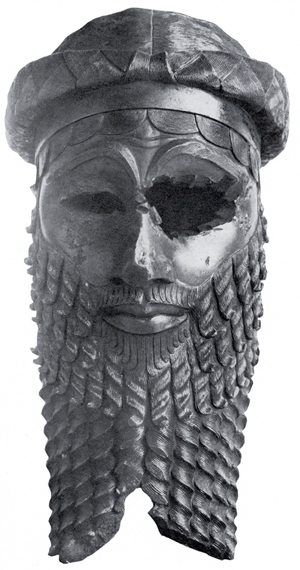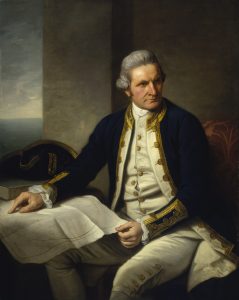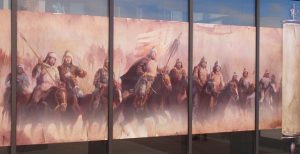Twelve thousand years ago, humans transitioned from hunter-gatherer societies to agriculture-based societies. Humans began to settle in ever larger communities, and gradually created civilizations. Neolithic villages began to flourish in Mesopotamia after 6000 B.C.E., due to its rich soil and water sources (Tigris and Euphrates rivers). The first of the civilizations that developed was the Sumerian. Many other civilizations would follow, including the Akkadian city-states, which would form to the north of the Sumerians.
According to Akkadian legend, a woman of Akkad became pregnant, carrying the illegitimate child of a temple priest. Unable to keep the child, she was forced to set her son adrift in a basket on the Euphrates River, where he was later found by a man named Akki, a gardener for Ur-Zababa, the King of the Sumerian city of Kish.1
This child would come to be Sargon of Akkad (Sargon the Great). He would grow to one day usurp the kingship of his own city of Agade, which would come to be the capital of his empire. After developing his Akkadian city of Agade and building a strong military, after 2350 B.C.E., he began to conquer. Many city-states located around Mesopotamia were involved in trading and attempting to aid one another, which often led to conflicts and war. Sargon used his army to bring these small conflicts to an end by conquering each Sumerian city-state one by one. He was viewed as a talented administrator and brilliant warrior. Sargon was wise in going on the offensive against the Sumerian city-states, conquering each, destroying all their defensive walls, as well as any enemy who stood before him. His empire is thought to have included most of Mesopotamia and parts of the Levant, besides incursions into Hurrite and Elamite territory, making him the founder of the Old Akkadian Dynasty as well as the first Mesopotamian Empire. The Old Akkadian Dynasty ruled for about a century after his death, until the Gutian conquest of Sumer. Historians believe that the Gutians were tribes of mountain people who, combined with the revolting people of the various conquered cities, were responsible for the downfall of the Akkadian Empire around 2150 B.C.E. .2
As the first emperor in history, Sargon of Akkad had much success. Despite having no prior example to follow, he was able to take over and maintain Mesopotamia for over fifty years. He financed his empire by seizing control of trade routes, taking all goods that crossed through his realm. This allowed his capital of Akkad (or Agade) to become the wealthiest and most powerful city in the world. He was able to maintain his empire by placing his best and most trusted men in positions of power in various cities. They would be appointed by Sargon himself to serve as governors and administrators in over 65 different cities. These leaders were referred to as the “Citizens of Akkad” in later Babylonian texts. Anytime Sargon took over a city, it rapidly became an Akkadian stronghold, full of Akkadian officials and troops.3 This stability throughout the empire allowed the construction of roads, a wider influence of trade, improved irrigation, as well as developments in arts and in science. Sargon standardized weights and measures for trade and daily commerce. He also managed to initiate a system of taxation and created the first postal system.

These various improvements to the lives of the people of Mesopotamia were not enough to prevent the various conquered peoples from gathering to rebel against Sargon and his administration. Being forced to stay under the rule of an emperor who defeated various groups, taking their land and goods, fueled the people to rebel. By 2150 B.C.E., the Akkadian Empire had collapsed in the midst of rebellion from within and from outside invaders attempting to take the fertile land of Mesopotamia. The story of Sargon loosing his empire to inside rebellion is only one of many. When a group of conquered people are forced to live under another’s rule, it is common for them to look for ways to strike back, overthrow those kings who often attempt to rule them well. Later rulers would improve Sargon’s administrative techniques by relying on centralized bureaucratic rule and regular taxation.4
Sargon created the very first political entity on a large scale and set the standards for all future rulers of empires. Through his unique upbringing, never meeting or knowing his parents, he was able to rise to power. Initially he was nothing but the king’s cupbearer (a butler); none expected that he would one day come to conquer and maintain the land wanted by all. Sargon of Akkad would become the topic of legendary narratives in later Assyrian and Babylonian literature, focusing on his rise to power from humble origins and his conquest of Mesopotamia. These memories of his successful deeds would later inspire conquerors to follow his example and would provide all the future people of Mesopotamia with a powerful hero to idolize.
- Ancient History Encyclopedia, September 2009, s.v. “Sargon of Akkad,” by Joshua J. Mark. ↵
- Ancient History Encyclopedia, September 2009, s.v. “Sargon of Akkad,” by Joshua J. Mark. ↵
- W. F. Albright, “A Babylonian Geographical Treatise on Sargon of Akkad’s Empire,” Journal of the American Oriental Society, Vol. 45 (1905): 193-201. ↵
- The Macmillan Encyclopedia, 2003, s.v. “Sargon of Akkad,” by Alan Isaacs. ↵



51 comments
Natalia Zuniga
Interesting article! I had never thought of where it all started and how the emperor rule came to be. You did great research and really got a better idea on how it was back then in Mesopotamia and how they lived The photograph of the bronze was a great touch to get a visual also the map. Overall great article!
Alyssa Valdez
What an informative and interesting article! I can tell you put a lot of time and effort into your research. this article just proves that anyone can be great in life. From a butler to king! I must admit i did not know much before reading this article but I am glad I was able to learn more about it!
Teresa Valdez
I love the narrative set up at the beginning. It really caught my attention, especially because early history is not usually interesting to me. The claim that Sargon the Great was the first emperor is really bold, but he lives up to the claim. His influence seemed to have a great impact on early society. This article does an amazing job at outlining Sargon as a legendary figure that made his mark on history.
Johnanthony Hernandez
Well written and informative article, I don’t know much about the Akkadian Empire. But this article makes me want to learn a bit more about its history. It’s interesting to see that after obtain his empire he lost it due to a rebellion, but it’s like most rules gained by usurping the previous ruler. But it was the beginning of the article that I thought drew many parallels with the story of Moses, I would have to do my research and try to get an estimated date of when that happened, but it does draw similarities that really peaked my interest.
Jennifer Pogue
Great article! I first noticed the similarity of the Bible story of when Moses’ mother put him in a basket in the river, and how Sargon of Akkad’s mother also put him in a basket and sent him down the river. It is very surprising that an “orphan” became the first ruler in history. I guess it goes to show that no one is limited to the conditions they were born into, there is always a potential of growth.
Nataly Solis Chavez
Hi Erick, great topic! Very well written altogether and interesting as well. You did a great job of keeping me engaged throughout the entire time. Based off the well organized structure and thorough researching and sources you provided you established great credibility. I feel as though I learned so much and what an inspirational story too, coming from nothing to becoming one of the worlds first emperors. Truly inspiring.
Samuel Sanchez
Great article, I never knew of him before. But wow after reading about Sargon and all greats accomplishments. Amazing how he started of as a kings butler and how he was able to become the first emperor of the world. He really set the standards and everyone that came after him was able to change the in order to not make his type of mistakes. It was really informative article. Keep up the great article
Bailey Rider
This was an interesting article! I had never heard of Sargon of Akkad before. It was cool to learn of his beginnings and his mother who floated his down the river like Moses. It was also cool to learn of his tactics for keeping this land under control. It’s very amazing that he accomplished so much, especially without any serious guidance. Thank you for the article!
Mariana Govea
Interesting article! What a great read! I never even had an idea who he was or what a great influence he was but reading your article educated me on him! It was very interesting how not only did you put what he did and how he did it but how other people viewed him as well which has a lot to do with how he did stuff! As well as it helped me understand how emperors took over territories and how they each looked up to one another to do the job! Very well researched and explained now that I know who he was and how influential he was to to other emperors makes me want to know more! Great job!
Christopher Repka
This was a well written and informative article. I did not know that the emperor of the world’s first empire was an orphan. It is interesting that he rose to such great power from so little. It would be interesting to learn more about Sargon, and perhaps how the people over which ruled thought of him. It is impressive, though, that he was able to accomplish so much without precedent. No person had done what Sargon did, or at least not in the capacity that Sargon accomplished.